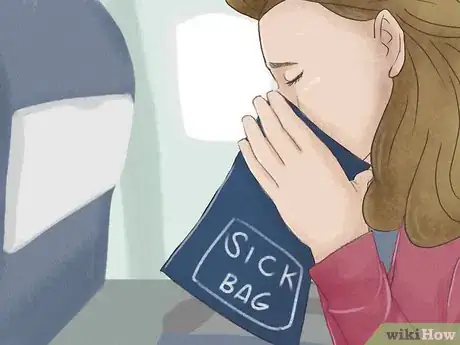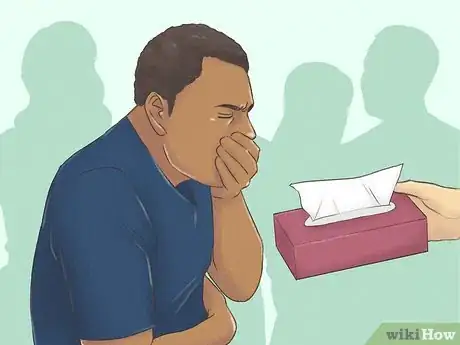This article was co-authored by Luba Lee, FNP-BC, MS. Luba Lee, FNP-BC is a Board-Certified Family Nurse Practitioner (FNP) and educator in Tennessee with over a decade of clinical experience. Luba has certifications in Pediatric Advanced Life Support (PALS), Emergency Medicine, Advanced Cardiac Life Support (ACLS), Team Building, and Critical Care Nursing. She received her Master of Science in Nursing (MSN) from the University of Tennessee in 2006.
There are 9 references cited in this article, which can be found at the bottom of the page.
wikiHow marks an article as reader-approved once it receives enough positive feedback. In this case, 84% of readers who voted found the article helpful, earning it our reader-approved status.
This article has been viewed 71,242 times.
From time to time, we all experience stomach discomfort. This discomfort can quickly turn into illness, which results in vomiting, a natural bodily function which is simply the regurgitation of the contents of the stomach through the esophagus and out of the mouth.[1] Vomiting, while a normal experience, is unpleasant and can have a sudden and unexpected onset. Moreover, when it occurs in a public place, the act of vomiting can be quite embarrassing, though it needn’t be.
Steps
Dealing with Sudden Sickness in Public
-
1Recognize the symptoms that precede vomiting. Many people notice nausea before they are sick. Nausea is the feeling that you might be sick.[2] Most people also experience over-activity in their parotid glands just prior to regurgitating, which causes salivation. By producing extra saliva, the body is helping to reduce the acidity of the vomit.[3] If you are experiencing these symptoms, quickly seek a bathroom or a place where you can safely release the contents of your stomach.
-
2Find a safe place to vomit if possible. Your end goal should be to keep yourself safe while also minimizing the mess that you will make while you are sick. In order to do this, assess your current environment as quickly as possible. You will then need to make a quick decision about where you will vomit. Consider the following:
- If you are near a bathroom, do your best to make it to the toilet before you are sick.
- If you are unable to make it to the bathroom, try to find a trash can or some type of container into which you can vomit to minimize the mess that you will make.
- If you are in a car, do your best to alert the driver to the fact that you are going to be sick and ask him or her to pull over.
- Finally, if you are unable to find a bathroom, container, or trash can in which to vomit, or if you are in a car, remember that your best bet might be to vomit outside. It is much easier to hose off a sidewalk or a gutter than it is to get vomit out of cloth seats or carpets.
Advertisement -
3Allow yourself to vomit. As awful as it can be, vomiting is a necessary reflex and it should not be suppressed. Especially in the case of food or alcohol poisoning, the body is desperately trying to rid itself of toxins, and it does this through the act of vomiting. Moreover, many things may lead to regurgitation and none of these things are anything to be embarrassed about. Causes of vomiting include, but are not limited to:[4]
- Pregnancy
- Food allergies
- Adverse reactions to medications
- Food poisoning
- Drinking too much alcohol
- Rotavirus
- Viral Gastroenteritis
- Migraine
- Chemotherapy
- Peptic Ulcer
Cleaning Up After Vomiting
-
1Clean yourself quickly while in public. If you’ve got vomit on your clothing, try to wash it off in a sink or with a wet wipe. Rinse your mouth out with mouthwash or water if you do not have a toothbrush and toothpaste with you. You might even want to splash some water on your face.[5]
-
2Clean up any mess that you might have made. If you got vomit on the floor or wall, or elsewhere that requires cleaning, do your best to clean it yourself. If the mess is too large for you to clean on your own, do not hesitate to ask for help. Depending on where you are, there might be a janitorial staff who is better equipped to clean up your vomit than you are.
-
3Do a thorough cleansing of yourself once you get home. Remember that vomit stays with you long after the action of regurgitating occurs. When you are finally able to do a thorough cleansing of yourself try the following:[6]
- Take a hot, steamy shower to remove vomit from you and your sinus cavity
- Blow your nose into a Kleenex directly after showering
- Thoroughly brush your teeth and gargle with mouthwash
- Eat a throat lozenge to calm a sore and scratchy throat
- Dry yourself completely and climb into comfortable clothing
Overcoming Embarrassment
-
1Remember that most people have been sick in public at some point in their lives. It's not the end of the world, and the people around you will likely have empathy. In fact, most people treat others who are ill with kindness.
- Embarrassment occurs when you have broken a social norm and you are worried that others are judging you negatively for your perceived transgression.[7]
- Others often meet an embarrassing ordeal with empathy and kindness, rather than with judgment, as this allows them to avoid a potentially awkward or embarrassing situation as well.
- For example, perhaps an office worker is experiencing morning sickness and vomits into her trash can in front of a co-worker. Her co-worker will likely ask if the woman with morning sickness is okay, if she needs anything, and sympathize with her, rather than offering a negative judgment of the woman’s condition or illness.
-
2Laugh it off. Another way of dealing with the embarrassment of being sick in public is to make a mild joke about it or to laugh it off.[8] It is often best to resort to humor when dealing with an uncomfortable situation, since humor eases tension. Moreover, laughing can help lower your stress levels, which are likely rather high after vomiting in public.[9]
-
3Apologize and then move on. Rather than dwelling on or making awkward commentary on your regurgitation, you should give a brief and confident apology to anyone who saw you vomit.[10] You might also ask them for help if you need help, but do not make your moment of sickness a topic for conversation. Instead, try to move forward with your day in a dignified and confident manner.
Taking Care of Yourself When You’re Ill
-
1Rehydrate yourself after vomiting. Vomiting can cause dehydration and a loss of electrolytes from the body.[11] Dehydration and lost electrolytes can cause fatigue. In order to combat this, be sure to drink plenty of clear liquids so you can rehydrate. The best things to drink after being sick include:
- Water
- Gatorade
- Pedialyte
- Electrolyte Water
- Chamomile, ginger, and mint tea can also help settle your stomach.
-
2Find a place to recover and take it easy. If you're with friends or family, they can help you get a drink of water and sit down. Often, it is a good idea to lay down to ease nausea and to encourage recovery.[12] Depending on the cause of your regurgitation, you may require a prolonged recovery period.
-
3Avoid foods and beverages like juice, soda, and milk until you are certain that you are on the mend. Eating or drinking certain things too soon after vomiting may lead to more sickness. Allow your stomach time to settle, particularly if you are dealing with food poisoning or a virus. Many doctors recommend following the bland BRAT diet when a patient is vomiting. The BRAT diet consists of:[13]
- Bananas
- Rice
- Applesauce
- Toast
-
4See a doctor if you are vomiting for longer than 12 hours or if your child has been unable to keep fluids down for longer than eight hours. A doctor will be able to determine and treat the cause of your vomiting. While vomiting is common and usually resolves itself, in some cases, it may be an indication of a serious or life-threatening condition. Be sure to call your doctor immediately if you have been vomiting and also experience:
- Chest pain
- Severe abdominal pain or cramping
- Blurred vision
- Confusion
- High fever and stiff neck
- Fainting
Expert Q&A
-
QuestionI am expecting and can't control vomiting. It comes on so suddenly where I cannot stop. What can I do?
 Luba Lee, FNP-BC, MSLuba Lee, FNP-BC is a Board-Certified Family Nurse Practitioner (FNP) and educator in Tennessee with over a decade of clinical experience. Luba has certifications in Pediatric Advanced Life Support (PALS), Emergency Medicine, Advanced Cardiac Life Support (ACLS), Team Building, and Critical Care Nursing. She received her Master of Science in Nursing (MSN) from the University of Tennessee in 2006.
Luba Lee, FNP-BC, MSLuba Lee, FNP-BC is a Board-Certified Family Nurse Practitioner (FNP) and educator in Tennessee with over a decade of clinical experience. Luba has certifications in Pediatric Advanced Life Support (PALS), Emergency Medicine, Advanced Cardiac Life Support (ACLS), Team Building, and Critical Care Nursing. She received her Master of Science in Nursing (MSN) from the University of Tennessee in 2006.
Board-Certified Family Nurse Practitioner It is recommended that you call your doctor or contact your healthcare provider as soon as possible. Being pregnant and unable to control your vomiting makes you especially vulnerable to being dehydrated which poses a health risk to you and your baby.
It is recommended that you call your doctor or contact your healthcare provider as soon as possible. Being pregnant and unable to control your vomiting makes you especially vulnerable to being dehydrated which poses a health risk to you and your baby.
Warnings
- Seek medical attention if your symptoms worsen or continue for longer than 12 hours.⧼thumbs_response⧽
- Vomiting can be induced by many illnesses, conditions, medications, allergies, or environmental factors. Please do not assume that you know the cause of your illness. When in doubt, please consult a doctor for a diagnosis.⧼thumbs_response⧽
- Vomiting could be a symptom of a serious or life-threatening condition.⧼thumbs_response⧽
References
- ↑ https://www.nlm.nih.gov/medlineplus/ency/article/003117.htm
- ↑ https://www.nlm.nih.gov/medlineplus/ency/article/003117.htm
- ↑ http://www.sciencefocus.com/qa/why-do-we-salivate-we-vomit
- ↑ https://my.clevelandclinic.org/health/symptoms/8106-nausea--vomiting
- ↑ http://afterhours.lifehacker.com/how-to-recover-from-vomiting-with-grace-and-elegance-1551532045
- ↑ http://lifehacker.com/5845265/a-simple-way-to-restore-yourself-to-freshness-after-you-vomit
- ↑ https://www.psychologytoday.com/blog/intense-emotions-and-strong-feelings/201112/embarrassment
- ↑ http://afterhours.lifehacker.com/how-to-recover-from-vomiting-with-grace-and-elegance-1551532045
- ↑ https://www.usa.edu/blog/how-laughter-can-relieve-stress/
- ↑ http://afterhours.lifehacker.com/how-to-recover-from-vomiting-with-grace-and-elegance-1551532045
- ↑ http://www.newhealthadvisor.com/How-to-Make-Yourself-Throw-Up.html
- ↑ https://www.nlm.nih.gov/medlineplus/ency/article/003117.htm
- ↑ http://familydoctor.org/familydoctor/en/prevention-wellness/food-nutrition/weight-loss/brat-diet-recovering-from-an-upset-stomach.html





































































Medical Disclaimer
The content of this article is not intended to be a substitute for professional medical advice, examination, diagnosis, or treatment. You should always contact your doctor or other qualified healthcare professional before starting, changing, or stopping any kind of health treatment.
Read More...